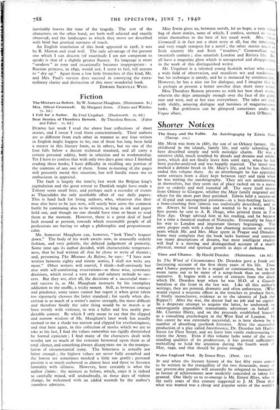Fiction
DURING last week I read the above four collections of short stories, and I swear I read them conscientiously. Their authors are as different from each other in manner as any four writers in English might happen to be; one of them has long been held a master in this literary form, as in others, but no one of the four falls below a decent technical standard, and all carry a certain personal oddity, both in selection and in workmanship. Yet I have to confess that with only two days gone since I finished reading these books, I have difficulty in recalling any portion of the contents of any one of them. Some re-turning of the pages will presently mend this situation, but will hardly rouse me to enthusiasm in appraisal.
The fault is largely the time's; last week the Belgian king's capitulation and the great retreat to Dunkirk might have made a Tolstoy seem small beer, and perhaps such a recorder of events as Thucydides the only justifiable offset of our daily papers. This is hard luck for living authors, who, whatever else they may also have to be just now, will surely best serve the common battle by continuing also to be writers, as long as ink and paper hold out, and though no one should have time or heart to read them at the moment. However, there is a great deal of hard luck around at present, towards which reasonable people of all professions are having to adopt a philosophic and proportionate calm.
Mr. Somerset Maugham can, however, " look Time's leaguer down." The body of his work awaits now, in unusually orderly fashion, and very politely, the delayed judgement of posterity.
Some time ago its author decided, with characteristic temperate- ness, that he had written all that he chose to write of theatre ; and, presenting The Mixture As Before, he says : " I h'ave now written between eighty and ninety stories, I shall not write any more." Other writers will marvel, I think—half-enviously but also with self-comforting reservations—at these wise, systematic decisions, which reveal a very rare and salutary attitude to suc- cess. But they are, after all, the decisions of a successful man— and success is, as Mr. Maugham instructs by his exemplary addiction to the snaffle, a tricky mount. Still, as between courage and prudence, some tastes cannot but regret it when great talent too rigorously chooses the latter standard ; for surely when dis- cretion is so much of a writer's native strength, the more difficult and therefore finally the safer thing would be to match it at least evenly with violence, to win a fuller and less neatly pre- dictable contest. By which I only mean to say that the clipped and narrow wisdom of Mr. Maugham's later work has usually seemed to me a shade too narrow and clipped for everlastingness, and that here again, in this collection of stories which we are to take as his last, I find the values somewhat too rigidly diminished by formal cynicism ; I find many of the characters dealt with worthy not so much of the restraint bestowed upon them as of total silence, and something always disaproints me in the manipu- lation of circumstantial irony. The bitterness is actually not bitter enough ; the highest values are never fully assaulted and the lowest are sometimes mocked a little too gently ; personal passion is so much eschewed as almost here and there to threaten formality with silliness. However, here certainly is what the author claims : the mixture as before, which, since it is indeed so carefully mixed, will undoubtedly, in these days of violent change, be welcomed with an added warmth by the author's countless admirers.
Miss Irwin gives us, between novels, let us hope, a very mixed bag of short stories, none of which, I confess, seemed to me to relate themselves to the best of her usual work. Mrs. Oliver Cromwell is in fact not a short story at all, but the interesting and very rough synopsis for a novel ; the other stories touch on Irish country life and Irish " troubles," Cromwellian and twentieth century ; also smartish London and Riviera life. But all have a magazine gloss which is unexpected and disappointing in the work of this distinguished writer.
Mr. Urquhart is a talented young Scottish writer who cove7, a wide field of observation, and manifests wit and tenderne- but his technique is untidy, and he is menaced by sentimentality. However, he has a nice ear for dialogue, and I imagine that he is perhaps at present a better novelist than short story writer.
Miss Theodora Benson presents us with her best short stories, wherein she skips amusingly enough over the face of the globe, east and west, and at her ease everywhere. The tales are slick, with slickly, amusing dialogue and heroines of magazine-covet looks. But gentleness can be glimpsed sometimes under the


































 Previous page
Previous page